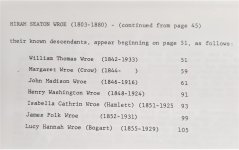arabensburg
Member
Some of the pieces of the puzzle are finally beginning to fit about the leather making career of N. J. Rabensburg as a young man.
James Polk Wroe, born 1852 in Wilson County, Tennessee, with Fayette County ties, is probably the mentor to N. J. Rabensburg in La Grange, Fayette County, Texas. James P. Wroe is a prominent saddle and holster maker in Fayette County and central Texas. Like Rabensburg, J. P. Wroe is known not only for his saddles but for the fine basket weave pattern and protective lining of his 19th and early 20th Century holsters.
It was recently stated by another on the Smith and Wesson Forum the following:
"James Wroe's relationship with W. T. Wroe, who employed A. W. Brill as an office manager, is unclear; I've researched this in the past. Beyond that the Wroes are a distraction from the Sunday scabbard's origin, relevant only to Brill himself and the Texas Rangers because his new wife was the widow of famed Ranger McNelly."
This statement may have merit with some, but I beg to differ and offer the following:
"William Thomas Wroe (born 1842), who was the owner of W. T. Wroe and Sons Saddlery in Austin, Texas happens to be the brother to James Polk Wroe of La Grange, Fayette County, Texas, who is likely the mentor to N. J. Rabensburg of La Grange.
J. P. Wroe is probably the driving force behind the early holster making career for N. J. Rabensburg and the one most responsible for Rabensburg's hook-up with Captain John R. Hughes of the Texas Rangers stationed in Austin. What better way to get the ball rolling than with a meeting at W. T. Wroe and Sons in Austin, Texas between Rabensburg and Hughes. Brother to brother."
W. T. Wroe, therefore, is not a "distraction" but rather the "center of attention" for the introduction of the "Sunday" holster to Captain John R. Hughes representing the Austin district for the Texas Rangers.
Between 1905 to 1907, the Wroe family recognized N. J. Rabensburg's prowess in leather making and gave him a "real shot in the arm" by introducing him and his "Sunday" holster to Captain Hughes of the Texas Rangers. This holster is also the original "Brill" and the porotype for the 1920s to early 1930s Rabensburg Llano-made holster and the final A. W. Brill holster from 1932 forward.
By Neale Rabensburg
James Polk Wroe, born 1852 in Wilson County, Tennessee, with Fayette County ties, is probably the mentor to N. J. Rabensburg in La Grange, Fayette County, Texas. James P. Wroe is a prominent saddle and holster maker in Fayette County and central Texas. Like Rabensburg, J. P. Wroe is known not only for his saddles but for the fine basket weave pattern and protective lining of his 19th and early 20th Century holsters.
It was recently stated by another on the Smith and Wesson Forum the following:
"James Wroe's relationship with W. T. Wroe, who employed A. W. Brill as an office manager, is unclear; I've researched this in the past. Beyond that the Wroes are a distraction from the Sunday scabbard's origin, relevant only to Brill himself and the Texas Rangers because his new wife was the widow of famed Ranger McNelly."
This statement may have merit with some, but I beg to differ and offer the following:
"William Thomas Wroe (born 1842), who was the owner of W. T. Wroe and Sons Saddlery in Austin, Texas happens to be the brother to James Polk Wroe of La Grange, Fayette County, Texas, who is likely the mentor to N. J. Rabensburg of La Grange.
J. P. Wroe is probably the driving force behind the early holster making career for N. J. Rabensburg and the one most responsible for Rabensburg's hook-up with Captain John R. Hughes of the Texas Rangers stationed in Austin. What better way to get the ball rolling than with a meeting at W. T. Wroe and Sons in Austin, Texas between Rabensburg and Hughes. Brother to brother."
W. T. Wroe, therefore, is not a "distraction" but rather the "center of attention" for the introduction of the "Sunday" holster to Captain John R. Hughes representing the Austin district for the Texas Rangers.
Between 1905 to 1907, the Wroe family recognized N. J. Rabensburg's prowess in leather making and gave him a "real shot in the arm" by introducing him and his "Sunday" holster to Captain Hughes of the Texas Rangers. This holster is also the original "Brill" and the porotype for the 1920s to early 1930s Rabensburg Llano-made holster and the final A. W. Brill holster from 1932 forward.
By Neale Rabensburg
Attachments
Last edited:



